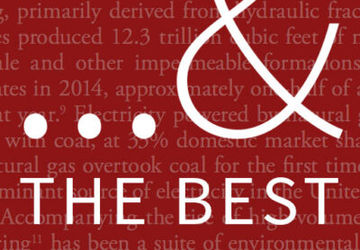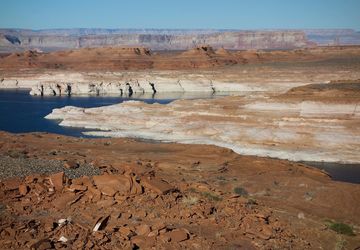Call of the Wild: HBO's 'Westworld' Serves Up Violence and Redemption
Starting from the premise that HBO’s Westworld should be understood both as science fiction and as a western, Kara McCormack examines the ways the ideologies of the mythic West are woven throughout the narrative landscape.

The Stanford lecturer Kara McCormack received her PhD in American Studies from the University of New Mexico and is currently a Thinking Matters Fellow at Stanford University. Here, she points toward the theme of redemptive violence, and asks in what ways “traveling” to the hypernatural and excessively unnatural space of Westworld could help us reclaim identity, attain absolution, and achieve renewal in the modern age.
By Kara McCormack
HBO’s highly anticipated Westworld—based on Michael Crichton’s 1973 science fiction western—premiered October 2 to much fanfare and critical acclaim. While making note of the sublime beauty of the western landscape captured in majestic panorama, most reviewers have focused on the show as science fiction. They point to the intention of Westworld’s creators, Jonathan Nolan and Lisa Joy, to shift sympathies away from the human tourists and onto the unsuspecting androids (called “hosts”) that populate the futuristic theme park for the sole purpose of entertaining their psycho-sadistic human guests.

Tourists to Westworld spend tens of thousands of dollars for a fully immersive experience in the “Old West” to indulge their perverse desires to murder, rape, and torture without judgment or consequence. Through the work of their creators—the morally conflicted engineers and scientists who question the hosts’ progression toward subjectivity—the hosts develop consciousness over the course of the season, becoming “more human” than their visitors.
What is missing from discussions about Westworld is that it takes place in the American West, the region historian Robert Athearn calls “the most American part of America.”
As has already been hinted at, this self-actualization inevitably will lead to the violent uprising that is the climax of the original film, a comment on the perils of a future dominated by artificiality that devolves into a terrifying mechanical dystopia. The inversion of Crichton’s original vision of aberrant androids to aberrant humans is something we’ve seen before: Blade Runner, A.I.: Artificial Intelligence, Battlestar Gallactica, and more recently Ex Machina all ask us to question at what point artificial life becomes legitimate life and what our responsibility is to the life we’ve constructed. Ultimately, we are forced to reckon with ourselves in this binary, to think about who is the real monster: Frankenstein’s creation or Frankenstein himself.
What is missing from discussions about Westworld is that it takes place in the American West, the region historian Robert Athearn calls “the most American part of America.” The attempt to define and understand the human spirit and the very nature of humanity in Westworld is accomplished by drawing sharp contrasts between techno-nightmares and idyllic visions of the natural world. The untainted landscape and the uncontaminated minds of our naïve hosts, wiped of the horrific memories of their brutal lives every night to wake up renewed each morning, point to a nostalgic understanding of the American Old West as it is imagined to have been before the shuttling in of the modern age. It is both a celebration of westward expansion as defined by Frederick Jackson Turner in his 1893 thesis “The Significance of the Frontier in American History,” and a sentimental yearning for what was lost through incorporation.
Turner believed that the true American character was a product of westward expansion and the continual distance put between America and Europe. His thesis celebrated the movement west into “free lands” by fearless pioneers, and saw that movement as an epic struggle between civilization and savagery. To him, the West was the single most important space through which the spirit and fortune of American society emerged.
Science fiction westerns use the trappings of the western as a starting point for taking on the “burdens of western history,” revealing the old triumphal frontier myth to be based on carnage and conquest.
Western films and television shows give expression to Turner’s thesis and give audiences access to the West of their collective fantasies. They are “travel narratives,” bringing viewers on mythic journeys that often function to uphold certain ideologies already in place about the nation, ideas about individualism, democracy, masculinity, and progress. Revisionist westerns of the 1960s and 1970s began to challenge the dominant romantic version of westward expansion and explore the darker side of the havoc that defined the progression west. Science fiction westerns use the trappings of the western as a starting point for taking on the “burdens of western history,” revealing the old triumphal frontier myth to be based on carnage and conquest.

By exposing the constructed and violent nature of the mythic West, Westworld is part of that trend. In the original, androids were programmed to start duels with the initially reluctant guests, offering them a “realistic” interaction with the space. In this updated version, homicidal humans murder innocent androids for fun, while homicidal hosts murder other hosts for the entertainment of human visitors. If a host is tortured or killed, he or she is reconditioned and out on the street the next day, thus allowing guests to live out a sanguinary reverie without repercussion—but also without the redemptive quality that many argue is imperative for audiences to align with a western hero. In some ways, the violence in Westworld is meaningless.
But there is a reason tourists are called to Westworld, and a reason viewers tune in to watch. Perhaps it is to view the epic struggle between civilization and savagery—the definitions of which are transposed from what Turner references in his thesis and believes imperative to the nature and prosperity of America. Perhaps it is to experience the regenerative force of the western landscape and escape the conditions of life in a modern industrial society, signaling a powerful need for self-renewal, for both characters and audiences. As Jane Tompkins tells us, the “desert light and the desert space, the creak of saddle leather and the sun beating down, the horses’ energy and force—these things promise a translation of the self into something purer and more authentic, more intense, more real.” It is ironic that audiences and visitors are seeking something “more real” through their experience with Westworld. It is, after all, a simulacrum, a hyperreal recreation of not the West as it actually was but a replica of the West as seen in westerns and in violent fantasies that have been built around the mythic West for decades.
Rather than asking with whom our sympathies lie, the hosts, the engineers, or the visitors, it might be more worthwhile to think about what audiences get out of the relationship between natural and unnatural, between human and host—a term implying an organic exchange, with the host being the stronger or dominant member of a symbiotic pair. In other words, we need them. It seems that audiences are working through their personal demons as embodied by all of the characters, whether the visitor who shoots a host in the back of the head and shouts “now that’s a vacation!” or the engineer who finds herself intensely attracted to an android call girl or the ineffective and emasculated male host with his inability to protect his female love interest from the savagery of life in the West. Perhaps we are all struggling to make sense of a history of violence on the frontier. Or maybe we are working through questions of identity and belonging in the contemporary era.
We don’t yet know who will be redeemed through all this bloodletting. If the mythic West is our guide, we can expect it to be those who most closely conform to how we imagine the best of ourselves. As Dr. Ford, the park director and creative mastermind behind Westworld, reminds us, visitors—and audiences—“are not looking for a story that tells them who they are. They already know who they are. They are here because they want a glimpse of who they could be.”
Want to post a comment or ask a question? Go to our version of the story on Medium, the social publishing platform.
Notes
- Athearn, Robert G. Westward the Briton (New York: Charles Scribner’s Sons, 1953).
- Tompkins, Jane. West of Everything: The Inner Life of Westerns. New York: Oxford University Press, 1992.
- Turner, Frederick Jackson. The Significance of the Frontier in American History, in John Mack Faragher, Rereading Frederick Jackson Turner: “The Significance of the Frontier in American History” and Other Essays. New Haven: Yale University Press, 1999.
- Read Turner’s “The Significance of the Frontier in American History” online

Kara McCormack received her PhD in American Studies from the University of New Mexico and is currently a Thinking Matters Fellow at Stanford University. Her research is situated in popular culture, cultural studies, and history, with particular emphases on the commodification and consumption of the U.S. West; conceptions and uses of history; critical tourism studies; film, television, and popular media; and science fiction.
Her first book, Imagining Tombstone: The Town Too Tough to Die, was released by the University Press of Kansas in May 2016. This work explores the ways popular culture, the concepts of history and authenticity, preservation, and economic exigencies interact in the historic western town of Tombstone, Arizona, as well as the ways Tombstone and the mythic West have circulated worldwide.


